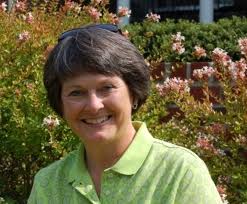MEET HOPE CLARK: A creative business leader who’s passionate about literature, learning and writing, Hope Clark is the Editor of Funds-For-Writers. This dynamo’s website won Writer’s Digest 101 Best Web Sites for Writers a whopping ten years in a row, from 2001-2011. Check out what this industry leader has to say about the impact of social media on customer sales, the future of the book industry, how writers can earn a living working with online clients and more!
 WMI: Your Fund for Writers enterprise won Writer’s Digest “101 Best Websites for Writers” from 2001 through 2011. Have you always envisioned yourself as a creative business leader who would provide employment, consultation and informative tools for writers?
WMI: Your Fund for Writers enterprise won Writer’s Digest “101 Best Websites for Writers” from 2001 through 2011. Have you always envisioned yourself as a creative business leader who would provide employment, consultation and informative tools for writers?
HC: No, I never considered myself a business leader. I see myself providing a service to the best of my ability, using all the talents I have. I’ve often been asked how I planned to get where I am today. I always say that you find success by just doing the day-to-day tasks to the best of your ability, focusing on being your best, serving people well, being credible, reliable and responsible. Most of all, respect your clients. I’ve never been one to try and be better than someone else, better than my peers. I just want to be my best. For some reason, that works. I think commitment and consistency takes a business leader further than watching the competition.
WMI: What inspired you to start Fund for Writers?
HC: I spoke to a small group of writers about how to write for the web back when web writing was new – the late 1990s. At one point some writers complained about being able to afford to write – the cost of conferences, computers, toner, postage and more. I started advising them financially. They told their friends, and the emails started coming right and left to the point I started a newsletter to avoid repeating myself in emails every evening when I came home from what was then my full-time job with the federal government. In three months, I had 1000 followers. I realized there was a need, so I capitalized on the situation and launched FundsforWriters.com. I saw it as a way to develop a platform (before people knew what the word platform meant) as well as a way to educate fellow writers using my knowledge base. It was all happenstance. Or you could look at it as my recognizing a way to incorporate what I knew with my love of writing. Today I have 41,000 readers across the four newsletters.
WMI: The Internet can offer opportunities and challenges for writers. It offers opportunities in the form of freelance writing jobs working for web-based businesses, a wealth of research material and marketing and networking platforms. Challenges come in the form of job scams, low paying jobs and request to write for clients for free. What advice do you have for writers that can help them to avoid challenges the Internet presents?
HC: First and foremost, quit looking for shortcuts. If it sounds easier or quicker than what you’re going through now, watch out. Developing a writing career is hard. It’s time consuming. It’s supposed to be frustrating and feel like it’s taking forever. You do not develop that talent overnight. You don’t decide to become a writer today and make a living by it in a matter of a few months. Just because it doesn’t require a degree, an office or a license, doesn’t mean it’s easier to do. On the contrary, you have to put the same diligence into it as you would acquiring a degree, job or license in order to be marketable. If you study your profession properly, the scams become obvious. Nobody taught me how to identify scams. Identification came as I taught myself about markets, publishers, agents, contests and freelance gigs. Study blogs, newsletters and sites published by reputable writers and organizations. The wiser you become, the less you become susceptible to scams.
WMI: How can writers take advantages of opportunities the Internet offers?
HC: Study blogs of those who have gone before you. Subscribe to newsletters and online magazines. Go to a few conferences, even online. Find a critique group, or two. Everything a writer needs to develop a career is now online. Opportunity is everywhere online. Be selective, of course. Take the time to determine who the experts are. Be willing to pay for a subscription or membership or two and you’ll learn faster. Take a class. Today you can sit in your study at home and figure out this profession, if you are willing to invest the time.
WMI: What do you do to keep the Funds For Writers newsletter viable and engaging for authors and students of the craft?
HC: Invest the time, read religiously, follow as many experts as possible, and believe in providing a quality product. Again, avoid the temptation to shortcut. Some say I have a unique writing voice. Frankly, I write as I speak – from the heart, from a deep place. I do not like emulating others. That’s a sure sign of a quick demise. Again, and I’ll say this many times, do not seek shortcuts.
WMI: You also feature grant programs that writers can participate in at Funds For Writers. Have you ever heard from writers who participated in any of the grant programs? If so, please share one to two stories with us, focusing on key takeaways writers gained from the experiences.
HC: Actually, I post calls for submissions for grants just like I do for contests, various markets, job openings and publisher needs. FundsforWriters does not dole out grant money of its own, a common misconception. But you won’t find more grant opportunities anywhere else than you will in our two newsletters, FundsforWriters and especially TOTAL FundsforWriters. FundsforWriters lists three grants every week. TOTAL FundsforWriters lists 12-15 grants every two weeks. I’ve had one reader land a retreat fellowship in France to finish writing a novel. Another was able to attend a conference for free thanks to a Highlights for Children opportunity; she was also able to have an editor read her work. Some writers have received emergency grants like those posted on my site at www.fundsforwriters.com/grants.htm, and were able to pay a medical bill, rent or a utility. One writer won a SCBWI grant offered only for an unpublished writer based upon a submitted manuscript, and landed a publishing contract. I’ve lost track of those who’ve landed opportunities they thought they never had a chance at, simply because I push readers to strive for grants, contests and markets. Somebody has to win, and the feedback, even if you lose, is a learning experience.
WMI: Hope, there’s a plethora of social networks, with more being created what feels like every three to six months. Tell us about five to six social networks you’ve found most effective at expanding your reach?
HC: Social networks can be addictive. I belong to Facebook and Twitter. I’ve spent a little time at Goodreads and BlogHer. I would not dream of entertaining 5-6 social networks. First, in order to properly utilize a social network, you need to use it thoroughly and become known on it – invest in it. To use 5-6 either means you are spending too much time on social networks, or you aren’t giving them justice to make them worthwhile. However, there is no rule as to where you build your platform, so no social network is right or wrong. Just don’t spread yourself thin. Otherwise your job becomes that of social networker instead of writer. I’d divide a freelance writer’s time as follows: marketing (including social networking) 10-20%, research & education 10-20%, administrative (a requirement if you work for yourself) 10%, and the balance writing and editing. It’s amazing how many writers get that balance wrong, forgetting that they’re writers first and foremost.
WMI: What is a Tweetebook? How did you arrive at the concept?
HC: A Tweetebook is a small ebook. I only put 20 markets in it, specializing on a theme such as Children’s Publishers or Short Story Markets or Filler Markets. They are inexpensive and attractive to people who don’t want to read fluff and just want the markets. I’m a firm believer in being concise and to the point, and I appreciate writers and experts who are the same. So I created Tweetebooks for those who had a need and didn’t want narrative.
WMI: A few years ago word on the street was that e-books were going to fall flat. Fast forward. Some authors have sold over a million copies of their e-books and Amazon.com reported that it sold more e-books than print books. How do you see e-books performing over the next two to five years?
HC: I always believed that e-books would excel. Back in the 30s, people stated that paperbacks would not work – that hardbacks were the only format acceptable. Paperbacks failed in 1931 and were brought back to life in the UK in 1935 by an entrepreneurial gentleman who, coincidentally, used unique and nontraditional locations to sell them. Sound familiar? It wasn’t until 1939 that the U.S., via Simon & Schuster, accepted paperbacks. That’s how evolution happens – gradually, not overnight. I’ve had e-books on FundsforWriters for over ten years. I knew that once formats because standardized, that e-readers would take off. Amazon became the Simon & Schuster of e-books – the entity that made e-books marketable. They are here to stay and will only get stronger in the marketplace. As an author, I don’t care how my book sells – paper or electronic. I just care that my work is read.
WMI: Can e-books and print books co-exist? Why do you think this?
HC: Yes, they will co-exist, just like paperbacks and hardbacks have for 70 years. How naive for us to think that one will dominate. People love variety.
WMI: Do you think it’s important for writers to blog, and if so, why?
HC: Absolutely; blog regularly. That’s the downfall of most writers in their blogging attempts – sporadic blogging. If writers would think about it, they’d realize that readers want regularity. Ever wonder why newspapers are delivered daily or weekly? Even AM or PM. Readers expect it. And the blog needs a unique personality, theme, or brand. Think about The Smithsonian magazine or Writer’s Digest magazine. You know what you are getting. You know when it will be delivered, whether online or in the mail. You know the parameters of the material. Blogs are abbreviated versions of magazines, only they are able to demonstrate more personality and open an exchange of conversation with comment ability. Readers these days are accustomed to exchange – tweets, Facebook, email, text, IM – we are a social population. That blog has to show your writing voice, personality and unique thoughts not found elsewhere. Blogs also fail because the author just copies other sites, or can’t define a crisp theme. They aren’t sure what to blog about, so they blog about themselves, which for the most part, readers are not interested in reading. Blogs need take-away value and smart posts. Yes, they are necessary, but they aren’t to be taken lightly. Sometimes a blog can be the determining factor as to whether someone signs up for a newsletter, follows a column or buys a book.
WMI: Any plans to write a book yourself, a novel perhaps?
HC: I’ve been writing novels for 12 years, and all my FundsforWriters readers have been following my progression. I refused to self-publish. I worked for years on a mystery series, my lifelong dream, and once I ran my mystery series by two critique groups, I began searching for agents. It took me two years and 72 queries to land my agent, and 18 months later she landed my publishing contract with Bell Bridge Books. Low Country Bribe, the first in the Palmetto State Series, comes out in February 2012. I’ve already written the second and third novels and am researching the fourth. When I couldn’t immediately publish the first novel years ago, I poured my energies into FundsforWriters, which I loved to do – while I reworked and improved the novel. I figured if it wasn’t catching the eye of agents and publishers, then it needed work. I’m so glad I took that path. The story and writing are so much better as a result of that time investment. And in the meantime, I developed a platform from which to broadcast my fiction. I’m a walking example as to why patience and diligence are worth so much.
WMI: What’s next for Hope Clark and Fund For Writers? What are your plans for the next five years?
HC: Pursue my novel mystery series, keep writing more stories, and keep nurturing FundsforWriters. I’m doing what I love now, and since both are so time consuming, I think I have my hands full. I’ll work to keep my mysteries unique and my FundsForWriters fresh and up-to-date. In fulfilling those two goals, I’m fulfilling a writer’s dream of having a profession doing what I love.
If you enjoyed (or benefitted) from this feature interview, share it with someone else by Tweeting it, forwarding it to your Facebook, Google Plus, StumbleUpon and LinkedIn followers.
Also Click Subscribe to Write Money Inc. RSS Feed on the side and bottom of this page to Get our FREE updates.
More about Portia and Long Walk Up is available at – www.chistell.com




Thanks so much for the interview! You made me look good!
All your followers can find much more info at http://www.fundsforwriters.com
Happy Holidays, everyone.
C. Hope Clark
Thank “you” for a great interview, Hope! Appreciate all you do for writers!
Fabulous interview. Lots of great gems in here. I especially like your advice to quit looking for shortcuts. The road to publication is long and tough, but it’s worth the hike if you take time to enjoy the journey. And this is the first time I’ve seen your debut novel title. Love it!
Appreciate your comment, Jessica. Hope does share some great gems and thought provoking ideas in the interview.